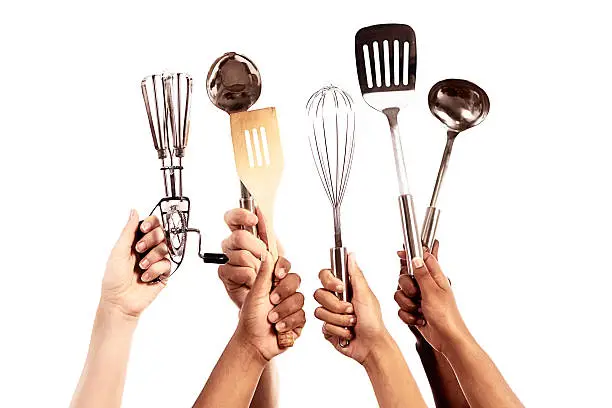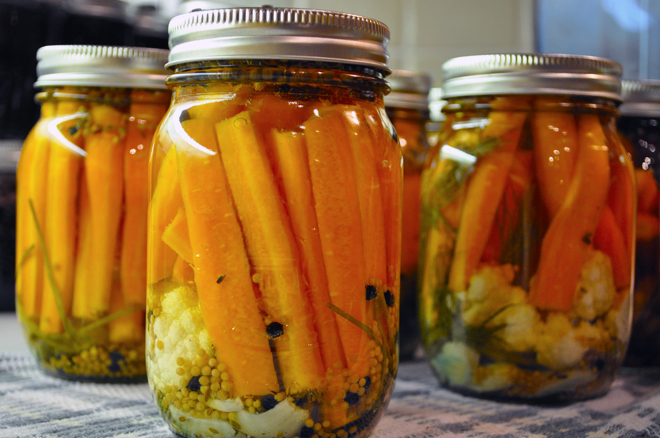
By Talia Chain, a young Jewish farmer, gardener, grower and lover of preserving the harvest.
When I refer to pickling food, what I am talking about is the lacto-fermenting type of pickling, the grandma in Russia type of pickling, as apposed to the American vinegar pickles. This is not to say vinegar pickles aren’t delicious but they just don’t have the same sour deliciousness or pro-biotic goodness that fermented foods have.
Quick science of fermenting:
1. Lactobacillus are bacteria on surface of plants.
2. When fermented, they turn the sugars of the plant into lactic acid.
3. Lactic acid inhibits the growth of harmful, or putrefying, bacteria thereby preserving the veg.
4. Lactic acid also promotes the growth of healthy bacteria in the intestinal tract.
The equation is this: lactobacillus + sugar + salt – minus oxygen + time = lactic acid fermentation and a delicious pickle.
Why you should ferment your food:
1. Preservation
If you can’t think of what to do with your cabbage, you only have a couple of weeks before it will have to be thrown into the compost, or your cucumbers did really well this year and there are only so many cucumber and cream-cheese sandwiches you can eat, fermenting your vegetables will mean they can last for months and even years in some cases. This is why fermentation is a practice as old as time, it is a way to preserve the harvest without freezers.
2. Health
Pickled vegetables are superfoods. The advertisements for Activia yoghurts always boast the health benefits of probiotics, but fermented vegetables are another way to get your probiotics in abundance without any of the unnecessary sugar and
preservatives processed yoghurts have. It is said that eating a fermented cabbage is healthier than eating a raw cabbage because we can’t get at the particularity healthy bacteria, the lactobacillus, living on the plant until it is fermented. Probiotics are responsible for promoting regular bowel movements, improving digestion, enhancing immune function, producing antioxidants, normalising skin conditions, reducing cholesterol, maintaining bone health, and managing blood sugar levels.
3. Deliciousness
There is nothing quite like biting into a crunchy, sour and dill-flavoured cucumber.
My fermenting tips…
Mason jars: Though lots of the pickle-aholics will be fermenting in large buckets, you can absolutely pickle in Mason jars. It’s best to sterilize your jars – just put them in the dishwasher on a hot temperature and put the veggies in when the jars are still hot after coming out of the dishwasher. If your jar has a rubber seal, boil that beforehand. Sterilising your jars means the only bacteria you should get growing on your pickles is the good kind.
Anaerobic process – don’t let the oxygen in!
You don’t want oxygen to get to your pickles or mould will form and the whole process will not work. Cover the top of pickles with cabbage leaves, or use a little jar with rocks to push down your vegetables under the brine, but make sure the brine covers any vegetables that you want to pickle.
Everyone has a different way of pickling:
And people get very heated about their way being the best way so brace yourself for some pickling arguments. However there are lots of ways to ferment vegetables and other things, grapes for wine, grain for beer etc, and the best thing to do is to get involved and try all of them until you find your favourite recipe for onion, apple and cabbage sauerkraut or super sour Kimchi. Do not lose heart if things go wrong, it will probably take a few goes but it will be worth it in the end.
Ferment everything:
Harvest some wild yeast and get a sourdough starter going. Soya beans make miso, milk makes yoghurt, all vegetables make kimchi. You can ferment chocolate, make cider, brew your own beer, make Ethiopian injera bread…. Once you start pickling, you realise how many things you can actually ferment and it is delicious.
If you’re interested in hosting a pickle workshop for a Bar/Bat-mitzvah, shul event or just general fun, email me at [email protected]


















